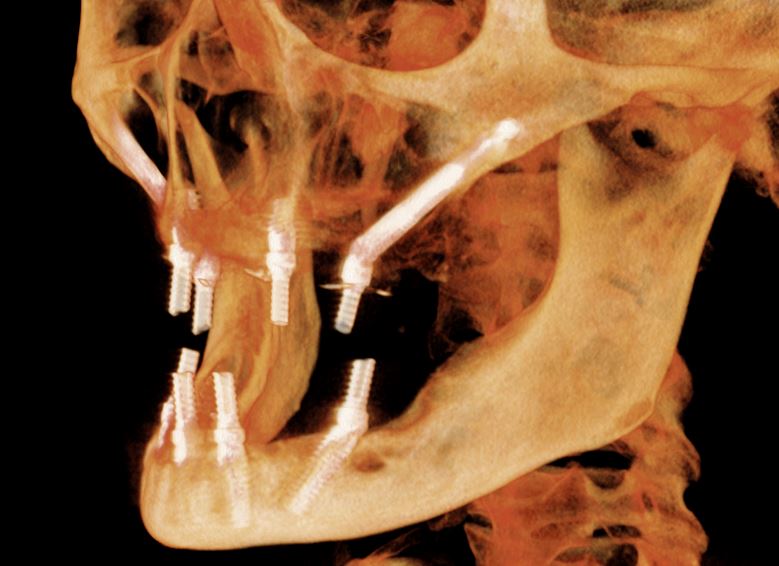Many people who are in need of dental implants don’t visit an oral surgeon because they have been turned away or feel like they may not be candidates due to bone loss from dentures. Regular dental implants may be unable to solve the problem of cheek bone loss, but fortunately, Dr. Almasri and the team at FastNewSmile can welcome these patients with open arms thanks to the Zygomatic implant.
Since FastNewSmile® Dental Implant Center specializes in Zygomatic dental implants, patients with significant bone loss can still benefit from the implant surgery that we offer.
Dr. Almasri is specifically trained to carry out Zygomatic implant surgery, and he is among the few hundred in the nation that are properly trained to do so.
This surgery anchors the Zygomatic dental implant partially into the jaw bone and partially into the Zygoma bone.
How Can Dr. Almasri Examine My Zygoma?
Utilizing state-of-the-art CT scans, Dr. Almasri can scan all of the bones of a face, from the top of the head, to below the chin. Using this machinery, the field of view of the Zygoma (cheek bone) is larger, and now, patients no longer have to be turned away because finding a bone to hold the implant was difficult.
Implants must be stable enough to support the teeth being attached to the implants on the day of surgery. With the technology that his office possesses, Dr. Almasri can pinpoint the exact spot where an implant can be successfully placed.
Keep in mind that not all patients require implants to be Zygomatic. Some patients might only need the procedure done on one side of the mouth and some may need zygoma on one side coupled with regular implants. It all depends on where the bone is.
Major Differences Between a Zygomatic Implant and Standard Tooth Implant
A normal tooth implant can range from 7mm in height to around 18mm. That is where that immediate bone area is and where the teeth are located.
The Zygoma implant is much longer. These implants can go 52.5 mm deep into the mouth and hit the Zygoma bone where it has finished deteriorating.
This is why the CT scan is pivotal in order for Dr. Almasri to know that his team is putting the implant in an area where there is enough bone to make that implant stable enough.
In most cases with the Zygoma surgery, Dr. Almasri is still able to attach the implant the same day because the bone is usually good enough.
The patients that have the standard implant size heal within 6 to 8 weeks with the bone completely stable. The healing process for Zygomatic surgery is around 4 months. It may take longer for a patient with this implant to heal, but the patient still has teeth.
Luckily for patients who opt for this surgery, aftercare is no different than with standard teeth implants, and taking care of your teeth with regular maintenance will make your surgery a part of the procedure’s high success rate.
FastNewSmile Successfully Performs Zygomatic Implants
If you have experienced bone deterioration and are in need of a tooth implant, Dr. Almasri and our team will be able to help you where others have turned you away. Get in touch with us today to find out more about our Zygomatic implants and how they can change the way your smile looks.

